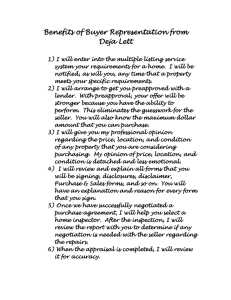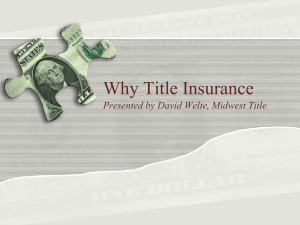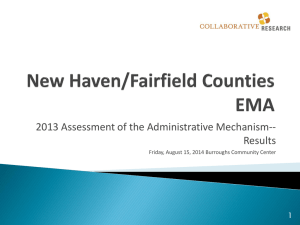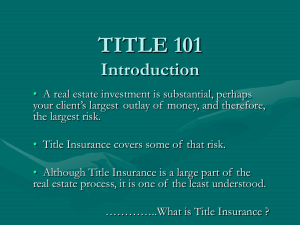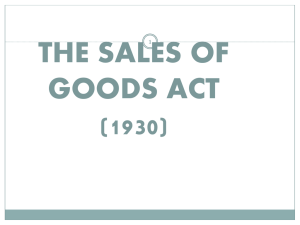top ten issues when buying distressed commercial
advertisement
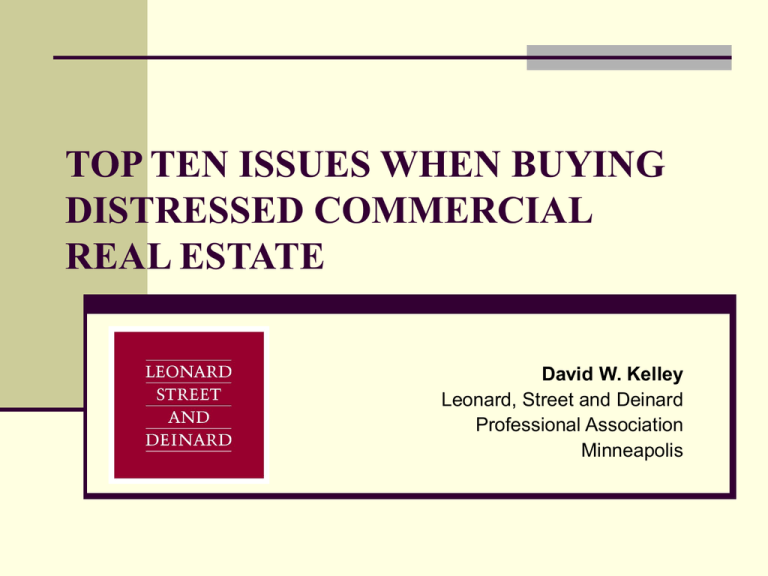
TOP TEN ISSUES WHEN BUYING DISTRESSED COMMERCIAL REAL ESTATE David W. Kelley Leonard, Street and Deinard Professional Association Minneapolis Client Expectations Manage your client’s expectations. Buyer’s lawyer should explain the process to client and discuss likely scenarios. Recognizing Distressed Property How do you know a property is “distressed”? Asking price below apparent market value. Property is serious disrepair. Property taxes delinquent. Tenants are complaining about property or owner. Mechanic’s liens filed. Seller has judgments or tax liens filed against it. Determining Status of Seller’s Mortgage Loan How to know seller is in default. What do you want to know? Two threshold questions: Will sale price pay entire mortgage debt? Will sale close before foreclosure concluded? Proceeding with seller. Special Purchase Agreement Provisions When Purchasing from Owner (Not Lender) What if buyer wants to terminate or renegotiate agreement? What transaction costs will be incurred by buyer and when? What if seller does not or cannot perform? Due Diligence Items deserving special attention: Physical condition of property. Tenant concerns. Buying from Seller’s Lender – Buying What? Lender’s interest – what stage is foreclosure in? Buyer’s options. Due diligence. Negotiating with Lenders How to contact lenders? Lender’s outlook on distressed property – buyer’s BFF? How does lender determine its price? Title Insurance If buyer from seller, title policy can insure that seller’s mortgage, mechanic’s liens and other liens have been satisfied. Title companies can insure any interest held by lender. Fraudulent Transfers Key questions to determine fraudulent transfer risk: Is purchase price less than fair market value? If so, is seller insolvent before or after the sale, or left with unreasonable small capital? If yes, sale is likely fraudulent as to seller’s other creditors and could be voided. Does seller have other creditors who are likely to attack sale, or is seller likely to file bankruptcy? Seller’s Bankruptcy Key bankruptcy principles to keep in mind: Seller/debtor may reject “executory” contracts. 11 U.S.C. § 365. Filing operates as automatic stay of commencement or continuation of collection efforts. 11 U.S.C. § 362. Foreclosing lender’s options in bankruptcy. Unperfected or improperly perfected mortgage may be avoided by trustee or debtor in possession. 11 U.S.C. § 544(a). Mortgage may be voidable preference or fraudulent conveyance. See 11 U.S.C. §§ 548(a) and 547(b). Questions & Answers If you would like a copy of the PowerPoint Presentation or any reference materials, please visit the Lecture Series section of the NCS website at www.firstam.com/ncs. An audio / video replay of this presentation will also be posted to our website at www.firstam.com/ncs. CLE credits are not available in all 50 states – to find out if credits for this webinar are available in your state, please contact your local NCS account representative. The views and opinions expressed within this presentation are those of David Kelley (and/or the law firm of Leonard, Street and Deinard) and not necessarily those of First American Title Insurance Company / National Commercial Services.
